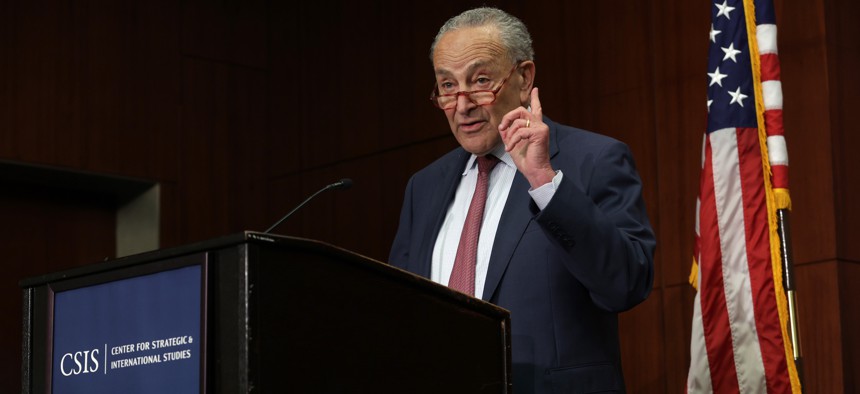Schumer says 'don't count Congress out' when it comes to regulating AI

Senate Majority Leader Chuck Schumer announces a framework for congressional action to regulate artificial intelligence technology in a speech at CSIS on June 21, 2023. Alex Wong/Getty Images
Senate Majority Leader Charles Schumer said Congress needs “to invent a new process” to effectively balance the dangers of artificial intelligence with the capabilities of these emerging technologies.
Senate Majority Leader Charles Schumer, D-N.Y., said Congress must play a central role in regulating artificial intelligence during a speech at the Center for Strategic and International Studies think tank on Wednesday, advocating for lawmakers to pursue a policy framework that addresses the safety concerns of consumers and industry while also “encouraging — not stifling — innovation.”
According to Schumer, lawmakers must prioritize a regulatory approach that positions continued AI innovation as “our North Star,” while also recognizing that “if people don't think innovation can be done safely, that will slow AI's development and prevent us from moving forward.”
Schumer said this entails balancing the potential harms of AI — which he said include “job displacement, misinformation, a new age of weaponry [and] the risk of being unable to manage this technology altogether” — with the impact that overly burdensome regulations can have on the broader tech sector.
He noted, for instance, the inherent challenges in promoting transparency around how AI tools work, since lawmakers have to weigh concerns about the type of data being used and produced by these emerging technologies with the need to protect companies’ intellectual property.
But Schumer expressed optimism that lawmakers will be able to effectively address these issues on a bipartisan basis.
“Don’t count Congress out,” he said, adding that lawmakers will need “to invent a new process to develop the right policies to implement our framework.”
Schumer added that “the typical path” of simply holding congressional hearings on proposed AI regulations will not allow lawmakers “to come up with the right policies,” since the speed of technological development means that “by the time we act, AI will have evolved into something new.”
“Our committees must continue to be the key drivers of Congress's AI policy response, continue to hold hearings and build bipartisan consensus,” he said. “But hearings won't be enough. We need an all-of-the-above approach, because that's what AI’s complexities and speed demands.”
Beginning in September, Schumer said he plans to “convene the top minds in artificial intelligence here in Congress for a series of AI insight forums” focused on “the biggest issues in AI.” He noted that each of these forums will center on a specific topic, including “asking the right questions,” copyright and IP use cases, “guarding against doomsday scenarios” and national security.
“Our job as legislators will be to listen to the experts and learn as much as we can, so we can translate these ideas into legislative action,” Schumer said.
Schumer noted that he established a bipartisan group of senators “to lead on this issue,” which includes himself and Sens. Martin Heinrich, D-N.M., Mike Rounds, R-S.D., and Todd Young, R-Ind. He added that he also asked key Senate committee chairs last week “to reach out across the aisle and together have the chair and ranking member identify and explore areas where we can get working.”
Schumer — along with Heinrich, Rounds and Young — sent a Dear Colleague letter to their fellow senators on June 6 announcing that they would be holding “three senators-only briefings on artificial intelligence,” with the briefings culminating in “the first-ever classified all Senate briefing on AI’s impact on national security.” The first of these briefings was held on June 13.
Schumer’s remarks come as lawmakers continue to introduce a barrage of bills to regulate AI and impose restrictions on the technology’s use, including a proposal last month from Sens. Michael Bennet, D-Colo., and Peter Welch, D-Vt., that would create a new Federal Digital Platform Commission with oversight authority over digital platforms and AI providers. House lawmakers this week also introduced legislation that would establish a 20-member commission to study AI.
“The AI revolution is going to happen with us or without us,” Schumer said. “If we can promote innovation, make sure it is safe [and] if America leads the way, the future will be far better, brighter and safer than if it happens without us.”






